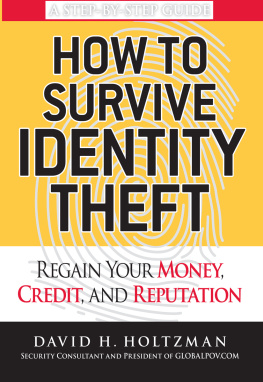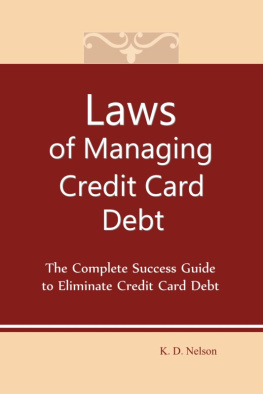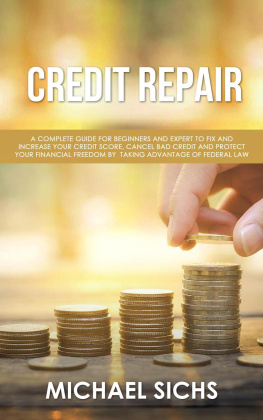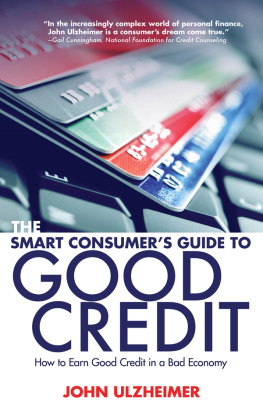Regard your good name as the richest jewel you can possibly be possessed of for credit is like fire; when once you have kindled it you may easily preserve it, but if you once extinguish it, you will find it an arduous task to rekindle it again.
01.
YOUR IDENTITY CRISIS
Sarah Gonzalez was fuming in the checkout line at Macy's. The clerk had just informed her that her Visa card had been denied and she couldn't understand why. She'd always been meticulous about paying her bills on time, and this was especially true when it came to paying down her credit cards. She was planning to buy a house next year and was counting on her good credit score to obtain a favorable mortgage. The clerk handed her the telephone so that she could talk to the Visa security representative. She listened, stunned, as he told her that her $10,000 limit was maxed out. I only had a few hundred dollars on my balance when I last got a bill, she protested. She began to cry.
Identity theft is the first truly new crime of the Information Age. Just as train robbery followed the invention of the steam engine, identity theft trailed right behind the development of our contemporary society and the revolutionary developments in computers, communications, big business, and big government that came with it.
DAMAGES
More than direct financial harm can result from identity theft. Identity problems will almost always end up causing havoc with your credit rating because, while the identity thief may take on almost every aspect of your financial life, he or she most assuredly won't pay your bills.
Thieves can and do steal income tax refunds, even ones based on falsely filed returns. They can intercept and cash any kind of government or corporate check, be it welfare, Social Security, food stamps, disability, pension, or insurance.
It doesn't have to be money either. It could be as insubstantial as frequent flyer miles or as solid as property. There have been cases where people have had cars and boats stolen and sold, and some victims have even had their houses and land taken from them.
All of the damages are not necessarily tangible. One of the most substantial and lasting consequences of identity theft is the damage done to your reputation. After your identity is snatched, the thief becomes you so that you are blamed for whatever they do. In this modern, computer-driven world, your credit report is your reputation.
As our lives become decentralized because of automated institutions, we no longer meet the people we do business with. Because of this, knowing your authentication secrets is sufficient proof to allow someone else to do anything that you can do. To identify ourselves to these strangers since we don't know their faces or voices we use machine-readable real-world identifiers such as name, address, and Social Security number, as well as synthesized ones like user IDs, account numbers, and passwords. These digital tags open the door to contemporary commerce, but they also open the door to identity theft.
THIS TIME IT'S PERSONAL
Identity theft is among the most personal of all crimes. If someone uncovers enough of your personal information, they can pretend to be you. Then they can use your identity to take the things that belong to you your money, your tax refunds, your credit score and cards, your insurance benefits, or your car.
Our desire for convenience makes the situation worse. While forcing everyone to go into a bank, show two forms of identification, and get fingerprinted might not completely eliminate identity theft, there's no question we'd be a lot safer. Unfortunately, this sort of thing is not convenient. We want to bank by phone or over the Internet.
All this adds up to relative safety for a thief when he or she tries to pass for you online, as compared to say, forging one of your checks and trying to cash it in a liquor store.
What kind of data does an identity thief steal? Some are public knowledge, like your name, address, phone number, and birthday. Some are semi-private, such as your employer, previous addresses, work history, educational background, and family members. Some information is private but not hard to find, like your Social Security (SSN), cell phone, or driver's license number. Some data are more difficult to get but worth the effort because of the potential payoff for a thief. In general, the more secret the information a dishonest person is able to steal from you, the greater their reward and the greater your loss.
Very private information might include the numbers of your bank accounts, credit card numbers, user IDs, or your passwords. Possession of these allows the thief direct access to money in your existing accounts without having to go through the hassle of opening up new ones. On the other hand, Federal Trade Commission (FTC) statistics indicate that opening up new accounts in the victim's name is the most lucrative for thieves and the most difficult for the victim to deal with.
Identity theft threatens each of us, every day. Every time we hand a waiter our credit card, throw a bank statement into the trash can instead of shredding it, or let our antivirus protection on our home computer lapse, we expose ourselves to a little bit more risk. Chances are that sooner or later someone somewhere will take advantage of that carelessness.
YOUR PERSONAL IDENTIFYING INFORMATION IS EASY TO GET
The basic problem, of course, is that it's not too difficult for others to tap into your personal information. Once someone has your name, address, birth date, driver's license, and some simple family information, he or she can successfully masquerade as you. As far as most of the companies that you do business with are concerned, this person might as well be you! With the addition of some financial information like an account number, an identity thief can conduct transactions, sell your assets, withdraw your money, or open up new credit accounts in your name.










